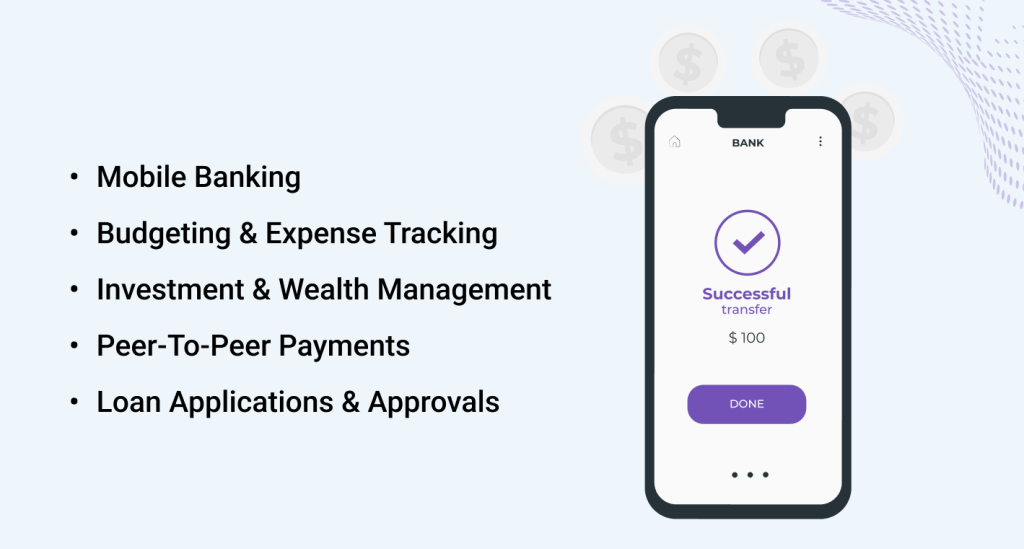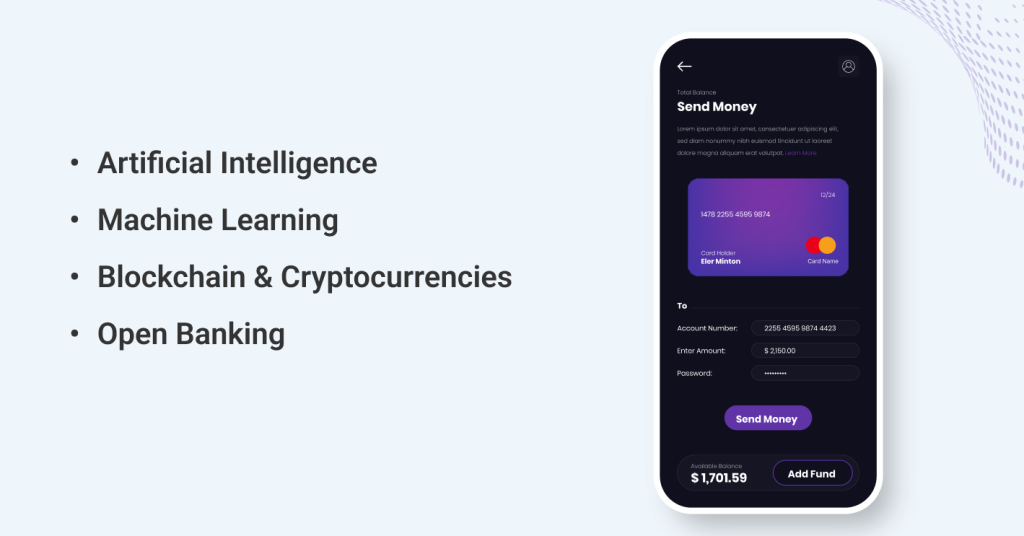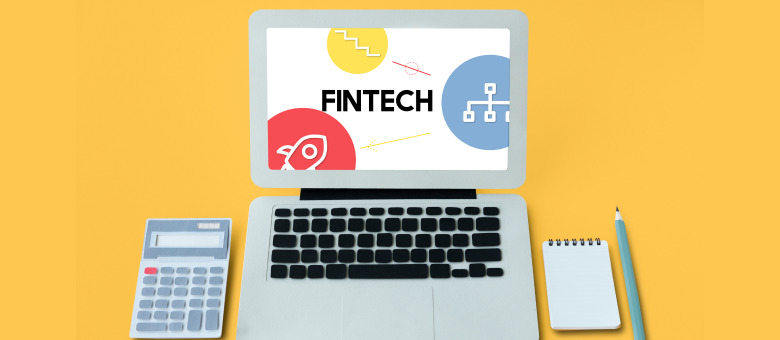The fintech sector has disrupted the financial industry and continues to grow exponentially. As of 2023, the fintech space is worth $179 billion. With a focus on convenience, efficiency, and personalized experiences, fintech apps are reshaping the financial landscape, catering to the needs and preferences of the modern consumer. But, what is fintech app development, and how to develop a fintech app in 2023? In this article, we will explore the nuances of fintech app development and delve into the key aspects that make these apps successful in the market.
From hassle-free mobile banking to seamless budgeting and investing tools, fintech apps are empowering individuals to take control of their finances with just a few taps on their smartphones. Whether it’s managing expenses, transferring money, or even securing loans, these apps offer a comprehensive suite of services at the users’ fingertips. Moreover, they provide a secure and transparent platform, ensuring data privacy and fraud prevention, which is of paramount importance in the digital era.
As the demand for fintech apps continues to rise, businesses worldwide are investing heavily in app development to stay ahead of the curve. By understanding the dynamics of fintech app development and adopting innovative technologies, financial institutions can successfully navigate the digital landscape and provide their customers with a seamless and intuitive banking experience.
The Evolution Of Traditional Banking
Traditional banking has come a long way since its inception. Initially, banking operations were primarily carried out through physical branches, where customers had to visit in person to perform transactions or seek financial advice. However, with the advancements in technology, the banking industry gradually shifted towards digitalization. The introduction of ATMs, online banking, and electronic fund transfers revolutionized the way customers accessed and managed their finances. This evolution laid the foundation for the rise of fintech app development.
The advent of smartphones further accelerated the shift towards digital banking. Consumers started demanding more convenience and flexibility in managing their finances. Traditional banks realized the need to adapt to this changing landscape and began investing in mobile app development to offer their customers a seamless and personalized banking experience. This marked the beginning of the fintech revolution, where technology and finance converged to create innovative solutions that catered to the evolving needs of the modern consumer.

Fintech, short for financial technology, refers to the application of technology in the financial industry to deliver innovative products and services. Fintech encompasses a wide range of technologies, including mobile apps, artificial intelligence, blockchain, and data analytics, among others. The primary goal of fintech is to enhance the efficiency, accessibility, and affordability of financial services.
Fintech is important because it addresses the pain points of traditional banking and offers solutions that meet the changing expectations of customers. fintech apps enable users to perform financial transactions anytime, anywhere, eliminating the need for physical branch visits. They provide a user-friendly interface that simplifies complex financial processes, making them accessible to a wider audience. With the help of advanced algorithms and data analytics, fintech apps offer personalized financial advice and recommendations, empowering users to make informed decisions about their money.
Fintech App Development Process
Fintech app development involves several stages, each crucial for the successful creation and launch of a user-friendly and feature-rich app. The process typically starts with ideation, where the app concept is conceptualized based on market research and customer needs. Once the concept is finalized, the next step is wireframing and prototyping, where the app’s structure and user interface are designed.
After the wireframe is ready, the app development phase begins. This involves coding, integrating APIs, and testing the app’s functionality to ensure it meets the desired standards. Once the development is complete, the app goes through rigorous testing to identify and fix any bugs or issues. Finally, the app is launched on the respective app stores and marketed to attract users.
It is important to note that fintech app development requires collaboration between designers, developers, and financial experts to ensure the app meets regulatory compliance and security standards. Additionally, continuous updates and improvements are necessary to keep the app relevant and competitive in the fast-paced fintech market.
Key Features And Functionalities Of Fintech Apps

Fintech apps offer a wide range of features and functionalities that cater to the diverse needs of users. Some of the key features include:
01. Mobile Banking
Fintech apps provide users with a convenient and secure platform to perform banking transactions on their smartphones. Users can check their account balances, transfer funds, pay bills, and even deposit checks using their device’s camera.
02. Budgeting & Expense Tracking
Fintech apps help users manage their finances by offering budgeting tools and expense-tracking features. Users can set financial goals, track their spending, and receive personalized insights and recommendations to improve their financial well-being.
03. Investment & Wealth Management
Fintech apps enable users to invest in stocks, bonds, and other financial instruments directly from their smartphones. These apps provide real-time market data, investment advice, and portfolio-tracking tools to help users make informed investment decisions.
04. Peer-To-Peer Payments
Fintech apps facilitate seamless peer-to-peer payments, allowing users to send and receive money with just a few taps. These apps leverage technologies like mobile wallets and QR codes to enable instant and secure transactions.
05. Loan Applications & Approvals
Fintech apps streamline the loan application process, making it faster and more convenient for users. Users can apply for loans, upload necessary documents, and receive instant loan approvals, reducing the hassle and paperwork involved in traditional loan processes.
Security And Privacy Considerations In Fintech App Development
Security and privacy are of utmost importance in fintech app development, considering the sensitive nature of financial transactions and personal data involved. Fintech apps must implement robust security measures to protect user information and prevent unauthorized access or fraud.
Security and privacy are of utmost importance in fintech app development, considering the sensitive nature of financial transactions and personal data involved. Fintech apps must implement robust security measures to protect user information and prevent unauthorized access or fraud.
Moreover, fintech apps must comply with data privacy regulations, such as the General Data Protection Regulation (GDPR) and the PERSONAL DATA PROTECTION BILL, 2019 in India. These regulations ensure that user data is collected and processed in a transparent and lawful manner, giving users control over their personal information.
Challenges And Opportunities In Fintech App Development
While fintech app development offers numerous opportunities, it also comes with its own set of challenges. One of the primary challenges is the need to strike a balance between innovation and regulatory compliance. Fintech apps must adhere to various financial regulations and security standards, which can sometimes limit the scope of innovation.
Another challenge is the fierce competition in the fintech market. With new apps entering the market regularly, standing out and acquiring users can be challenging. Fintech companies must focus on creating unique value propositions, delivering exceptional user experiences, and leveraging effective marketing strategies to gain a competitive edge.
Despite these challenges, fintech app development presents immense opportunities for growth and disruption. The increasing adoption of smartphones, advancements in technology, and changing consumer preferences have created a fertile ground for fintech apps to thrive. By leveraging emerging technologies like artificial intelligence, blockchain, and machine learning, fintech apps can continue to innovate and transform the financial industry.
Examples Of Successful Fintech Apps

Several fintech apps have achieved tremendous success in the market, revolutionizing the way we manage our finances. Here are the top 10 fintech apps in India currently based on their usage rank and Play Store rank. (Source: SimilarWeb)
Fintech App Development Trends To Watch Out For

The fintech industry is constantly evolving, driven by technological advancements and changing consumer expectations. Here are some key trends to watch in fintech app development:
01. Artificial intelligence and Machine Learning
AI and machine learning algorithms are being increasingly integrated into fintech apps to enhance personalization, automate processes, and improve fraud detection and prevention. Here are some key ways in which fintech apps have been utilizing AI and ML to offer personalized financial services:
- Analyse Data
AI-powered fintech apps can analyze users’ financial data to create personalized financial plans and budgets that are tailored to their individual needs and goals. - Calculate Risk
AI can be used to assess the risk associated with lending money to a particular individual or business. This can be done by analyzing data points such as credit history, transaction patterns, and other relevant factors. - Personalized Recommendations
AI can be used to recommend personalized investment strategies and portfolios based on users’ risk tolerance, investment goals, and financial situation. - Expense Tracking
Categorize and track users’ expenses, making it easier for them to understand their spending patterns and identify areas where they can save money. - Chatbots & Virtual Assistants
AI-powered chatbots and virtual assistants are becoming increasingly common in fintech apps. These can engage in natural language conversations with users, answering their queries, providing financial advice, and assisting with transactions. - Fraud Detection
Machine learning algorithms can be used to detect fraudulent activities in real time by analyzing transaction data and identifying suspicious patterns. This helps protect users from unauthorized transactions and enhances security. - Customer Support
AI-driven chatbots and virtual assistants can also help improve customer support by providing instant responses and personalized assistance to users. This can enhance the overall user experience and engagement. - Predictive Analytics
Fintech apps can use predictive analytics powered by AI and machine learning to forecast financial trends and market movements. This information can be valuable for users making financial decisions. - Security
AI-driven voice recognition and biometric authentication can enhance security by allowing users to access their accounts using their voices or unique physical characteristics. This adds an extra layer of protection against unauthorized access. - Savings
Fintech apps can use AI algorithms to automatically round up transactions to the nearest dollar or a preset amount and transfer the spare change to savings accounts or investment portfolios. This can encourage users to save effortlessly.
- Analyse Data
02. Blockchain & Cryptocurrencies
The adoption of blockchain technology and cryptocurrencies is on the rise, offering secure and transparent transactions, reducing costs, and eliminating intermediaries in financial transactions.
- Secure & Transparent Transaction Records
Blockchain is a distributed ledger that records transactions securely and transparently. This makes it more difficult to commit fraud or errors. - Faster And Cheaper Cross-Border Transactions
Blockchain can be used to facilitate faster and cheaper cross-border transactions. This is because it eliminates the need for intermediaries, such as banks and payment processors. - Increased Financial Inclusion
Blockchain can help increase financial inclusion by making it easier for people to access financial services. This is because it eliminates the need for traditional financial institutions, which can be expensive and inaccessible. - Automated Processes
Smart contracts can be used to automate processes such as loan origination and payments. This can improve efficiency and reduce costs. - Innovative Financial Solutions
Blockchain can be used to create new and innovative financial solutions, such as decentralized finance (DeFi). DeFi applications offer lending, borrowing, and investment opportunities without the need for traditional financial institutions.
- Secure & Transparent Transaction Records
03. Open Banking
Open banking is a financial services revolution that allows customers to share their financial data with third-party providers through APIs. This data can be used to create a variety of innovative financial products and services, such as:
- Personal Financial Management (PFM) Tools
These tools can help customers track their spending, set budgets, and identify areas where they can save money. - Credit Scoring
Third-party providers can use open banking data to create more accurate credit scores, which can help customers get approved for loans and other financial products. - Fraud Detection
Open banking data can be used to identify fraudulent transactions, which can help protect customers from financial loss. - Investment Advice:
Third-party providers can use open banking data to provide customers with personalized investment advice. - Account Aggregation
This allows customers to see all of their financial accounts in one place, which can make it easier to manage their money.
- Personal Financial Management (PFM) Tools
Open banking APIs are still in their early stages of development, but they have the potential to revolutionize the financial services industry. By giving customers more control over their data, open banking can empower them to make better financial decisions.
One of the best examples of open banking is UPI (United Payments Interface).
The Future Of Fintech App Development
Fintech app development has revolutionized the way we perceive and interact with financial services. From traditional banking to digital innovation, fintech apps have become an integral part of our daily lives, offering convenience, efficiency, and personalized experiences. As the demand for fintech apps continues to rise, businesses must invest in app development and adopt innovative technologies to stay competitive in the market.
The future of fintech app development looks promising, with emerging technologies like AI, blockchain, and open banking driving innovation and disruption. However, it is essential to address the challenges of regulation, security, and competition to ensure the success of fintech apps. By staying abreast of the latest trends and continuously improving user experiences, fintech app developers can shape the future of finance and empower individuals to take control of their financial well-being.
FAQs On Fintech App Development
1. How much does it cost to launch a FinTech app?
The cost of launching a fintech app can vary depending on the complexity of the app and the features it includes. But developing fintech apps can range from $50,000 to $500,000 or more.
2. What is a fintech mobile app?
A FinTech mobile app is a financial technology application that uses mobile devices to provide financial services to users. They can offer a variety of financial services, such as banking, investing, payments, and insurance.
3. How to develop a FinTech app?
To develop a FinTech app, you need to:
01. Define your target audience and their needs.
02. Choose the right programming language and framework.
03. Use cloud computing and containerization.
04. Implement security measures and compliance requirements.
05. Develop a Minimum Viable Product (MVP) that includes the most essential features.
Here are some specific examples of tech stacks that are commonly used for FinTech app development:
Frontend: React, Angular, Vue.js
Backend: Python, Java, C++, Go
Database: PostgreSQL, MySQL, MongoDB
Cloud: AWS, Azure, GCP
Security: OAuth 2.0, HTTPS, TLS
4. What programming is used in fintech?
The most popular programming languages for FinTech are Python, Java, C++, and Go.
These languages are all known for their versatility, scalability, and security, making them ideal for developing FinTech applications.
Here are some additional programming languages that are commonly used in FinTech:
SQL: for data manipulation and analysis
JavaScript: for front-end development
Ruby: For web development
Swift: for iOS development
Kotlin: for Android development
Choose Aipxperts As Your Fintech Development Partner!
If you are looking for a fintech development partner who can help you build a secure, scalable, and innovative Fintech solution, then Aipxperts is the right choice for you. We will work with you to understand your business needs and develop a solution that meets your specific requirements. We will also provide you with ongoing support and maintenance to ensure that your fintech solution remains up-to-date and secure. Reach out to us today to kickstart your project!
What Is Fintech App Development?: Choose Aipxperts to build a secure and reliable Fintech app from scratch. Contact us for project estimates and enjoy a 15-day risk-free trial period. Check out our portfolio to explore the Fintech apps we have worked on.











